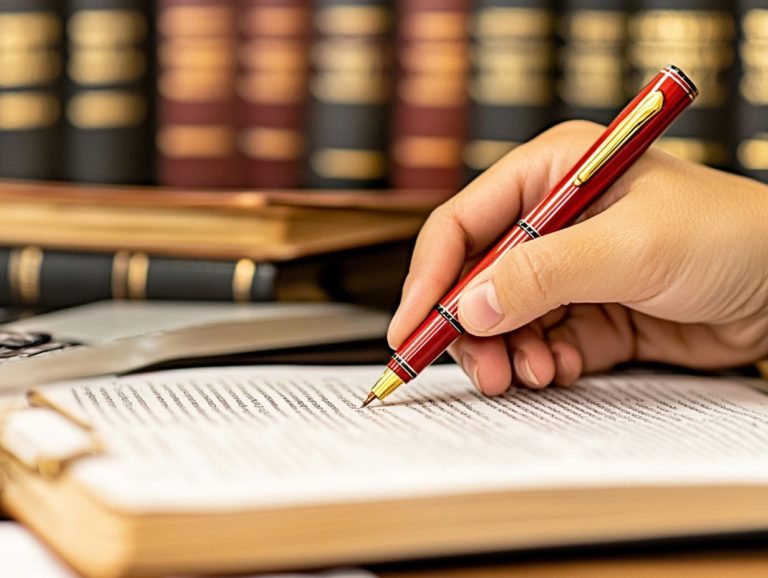5 Essential Tips for Licensing Agreement Compliance
Navigating licensing agreements can feel overwhelming. However, understanding and following them is vital for any business’s success.
This article highlights common pitfalls you need to avoid while presenting essential strategies for compliance. Start by gaining a thorough understanding of the agreement s terms and fostering clear communication with licensors.
It underscores the numerous benefits of remaining compliant, whether you re a seasoned professional or just beginning your journey in licensing. These insights will equip you to manage your agreements effectively and protect your business’s interests.
Contents
- Key Takeaways:
- 1. Master Your Licensing Agreement s Terms!
- 2. Keep Accurate Records of All Licensed Products
- 3. Ensure Proper Use of Licensed Materials
- 4. Communicate Regularly with the Licensors
- 5. Stay Up-to-Date on Changes to the Agreement
- What Is a Licensing Agreement and Why Is Compliance Important?
- What Are the Common Mistakes Companies Make with Licensing Agreement Compliance?
- Frequently Asked Questions
- What is a licensing agreement?
- Why is compliance important for licensing agreements?
- What are the consequences of non-compliance with a licensing agreement?
- What are the 5 essential tips for licensing agreement compliance?
- How can I ensure compliance with a licensing agreement?
- What should I do if I discover non-compliance with a licensing agreement?
Key Takeaways:
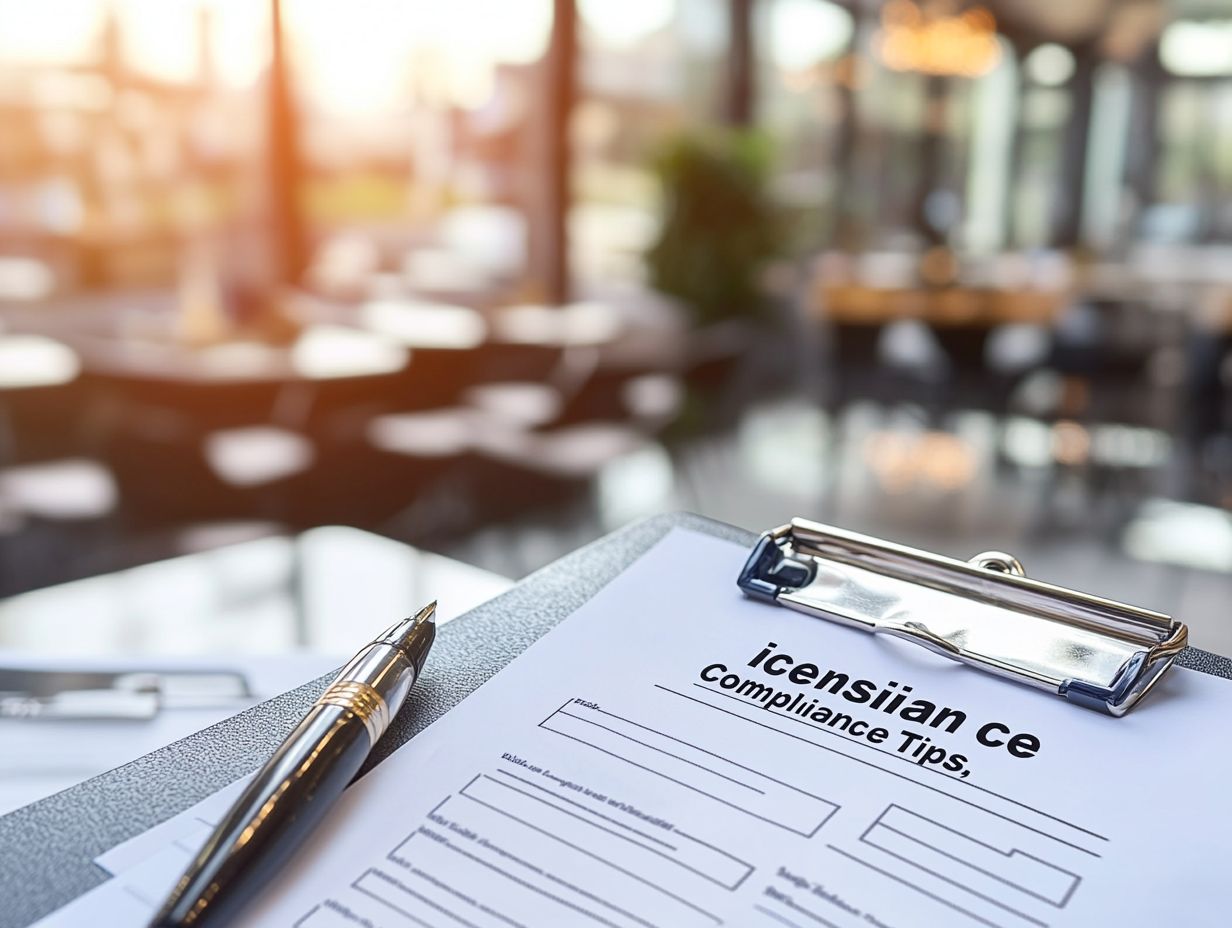
Understand your licensing agreement’s terms to avoid penalties. Keeping detailed records of all licensed products can help prevent misunderstandings. For a deeper insight, consider the 5 key takeaways from successful licensing agreements and communicate regularly with licensors to stay updated on any changes.
1. Master Your Licensing Agreement s Terms!
Understanding the terms and conditions of a licensing agreement is essential for compliance with intellectual property laws. It also helps protect the rights of everyone involved. This is particularly relevant for media companies like OpenAI, Vox Media, and Atlantic, as they navigate complex legal contracts. These companies can benefit from 5 ways to leverage licensing agreements for growth to secure their proprietary technology and creative assets.
These agreements typically include important parts like copyright and trademark rights, dictating how intellectual property can be used, shared, or modified. You must fully understand your legal obligations to avoid serious issues! These often include confidentiality clauses (rules that keep sensitive information private) designed to protect sensitive information and compensation clauses outlining payment structures.
Implementing contract management software can significantly streamline your compliance processes. These tools can be extremely helpful, ensuring that all terms are consistently met and making it easier for you to track deadlines and renewals.
2. Keep Accurate Records of All Licensed Products
Maintaining accurate records of your licensed products is crucial for ensuring license compliance and avoiding potential contract breaches that could lead to costly legal disputes.
To achieve this, keep comprehensive records that include licensing fees, relevant software applications, and detailed usage logs. This meticulous documentation helps you track expenditures and fosters accountability in software deployment across your teams.
Compliance audits play a vital role in this process. They verify your records and assess whether your organization adheres to the specified licensing agreements. By conducting regular audits, you can identify discrepancies, proactively address potential non-compliance issues, and ultimately protect your assets from legal ramifications.
3. Ensure Proper Use of Licensed Materials
Ensuring the proper use of licensed materials involves more than adhering to specific licensing terms. It also requires you to implement quality control measures that protect against misuse and potential legal consequences.
These measures are vital for establishing a clear understanding of the quality and scope of use permitted under each license. By grasping the nuances of these terms, you significantly reduce the risk of inadvertently crossing boundaries, leading to expensive legal disputes.
Equally important is adopting risk assessment strategies, such as conducting regular audits and compliance checks. These steps help you evaluate the potential impact of improper use.
Being aware of the applicable legal jurisdiction can also be a game-changer. It ensures that any issues stemming from misuse are handled within the appropriate legal framework.
4. Communicate Regularly with the Licensors
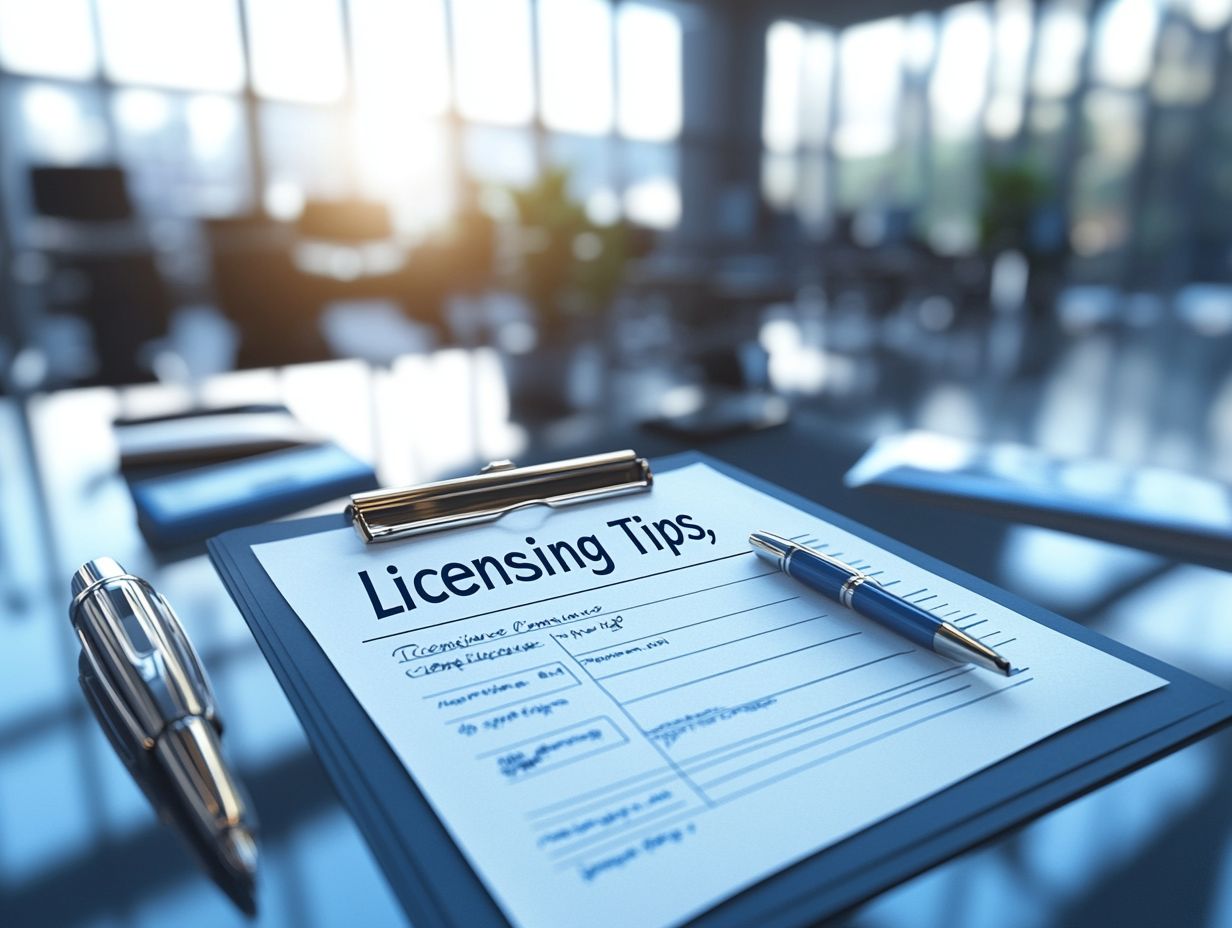
Regular communication with licensors is essential for transparency. It ensures everyone is aligned on the licensing agreement terms.
This proactive approach helps mitigate misunderstandings and builds stronger partnerships. Establish a routine for updates and check-ins to foster ongoing dialogue.
Stakeholders should feel empowered to voice any issues. Early intervention can prevent disputes from escalating into bigger conflicts.
It’s crucial to understand your legal obligations within the licensing framework. This ensures all parties are aware of their rights and responsibilities.
By prioritizing open communication, licensors can strengthen their relationships. This also enhances the efficiency and effectiveness of their collaborations.
5. Stay Up-to-Date on Changes to the Agreement
Staying updated on licensing agreement changes is crucial for compliance. Even minor revisions can impact your legal obligations and compensation, so knowing how to negotiate a licensing agreement is essential.
Implement periodic contract reviews to systematically assess any adjustments. This makes managing updates much easier.
Invest in contract management software to streamline this process. It can provide automated alerts for renewals or modifications.
Regular compliance audits are vital. They ensure all parties adhere to the latest terms, safeguarding against potential disputes.
By prioritizing these strategies, you create a transparent and legally sound environment for your organization.
What Is a Licensing Agreement and Why Is Compliance Important?
A licensing agreement is a legal contract that gives you permission to use someone else’s creations, like inventions or music. Following these agreements is important for protecting copyrights and trademarks.
These agreements typically outline usage parameters, payment structures, and the responsibilities of all involved parties. Their importance lies in protecting the rights of both licensors and licensees.
Failing to comply can lead to serious consequences, such as lost revenue and damaged reputations. You might find yourself facing costly legal battles.
By following these agreements, you build trust and enable smoother collaborations. These elements are essential for successful business relationships that drive innovation.
What Are the Consequences of Non-Compliance?
Not complying with licensing agreements can lead to severe consequences. Financial penalties and serious legal disputes may threaten your intellectual property rights.
If your business disregards specific copyright terms, you risk losing exclusive rights to use crucial software. This could undermine your competitive edge.
Engaging in litigation saps your financial resources and tarnishes your company s reputation. This makes future partnerships more challenging.
To navigate these risks, implement proactive compliance strategies. Regular legal reviews ensure all agreements are followed meticulously.
This disciplined approach helps you identify potential issues early. You can address them before they escalate into costly legal battles.
How Can a Company Ensure Compliance with a Licensing Agreement?
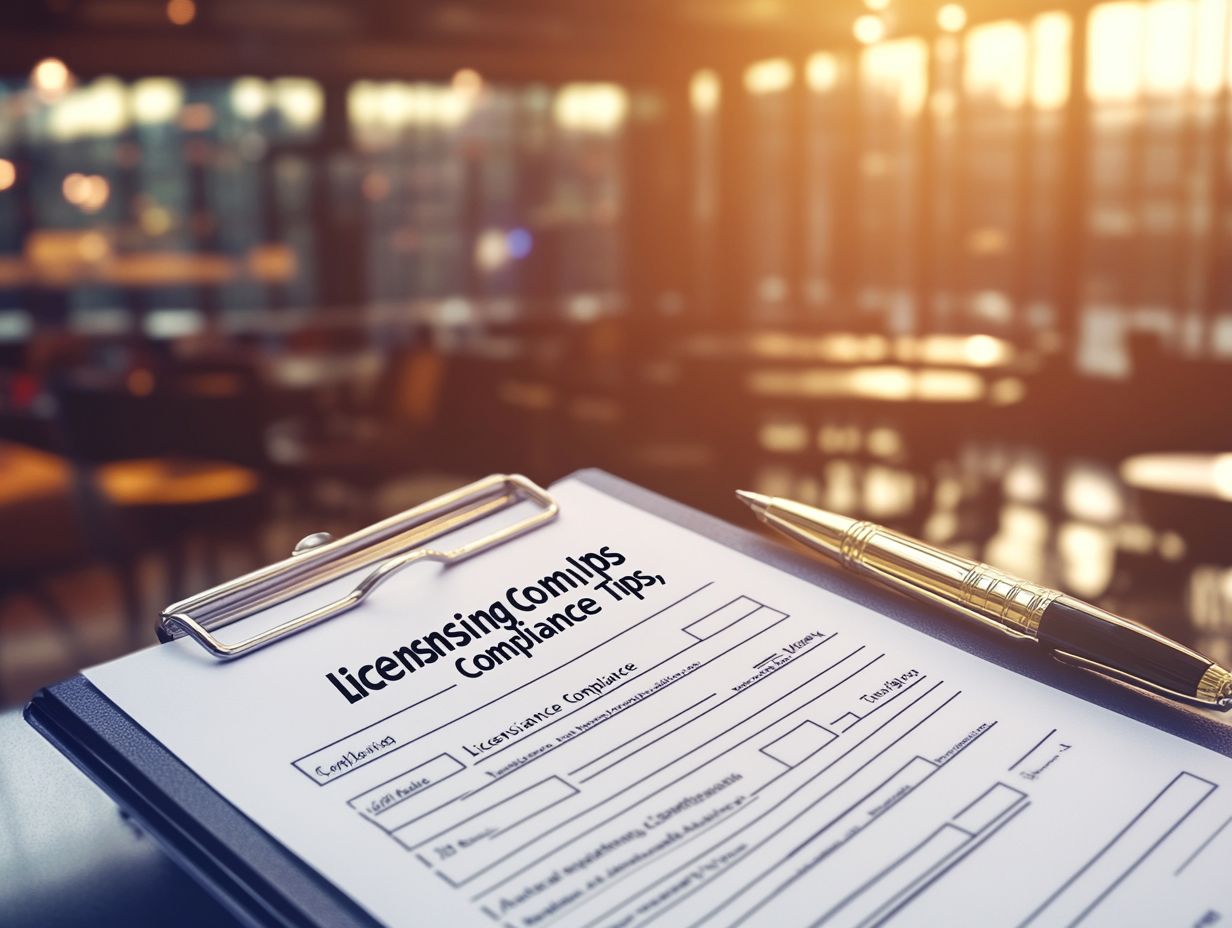
To ensure compliance with a licensing agreement, you should implement strong contract management software and conduct regular compliance audits. This allows you to keep a close eye on adherence to the rules of using someone else’s work and legal obligations, while also being aware of myths about licensing agreements that you need to know.
This software can streamline the tracking of critical dates, automatically sending you reminders for renewals and assessments of contractual obligations. This helps you avoid costly oversights.
Equipping your staff with comprehensive training on licensing terms fosters a deeper understanding of their responsibilities. This minimizes the risk of unintentional violations.
Maintaining organized and accessible records is equally crucial. It simplifies the audit process and ensures that all necessary documentation is readily available.
By embracing these tools and processes, you can cultivate a culture of compliance while effectively safeguarding your interests.
What Are the Common Mistakes Companies Make with Licensing Agreement Compliance?
You might find that common mistakes regarding licensing agreement compliance stem from a lack of understanding of the licensing terms, neglecting to track expiration dates, and insufficient contract reviews. To avoid these pitfalls and learn how to protect your rights in a licensing agreement, it’s crucial to stay informed. These mistakes can lead to costly delays and legal consequences.
Many companies underestimate the intricacies of licensing fees. This can create budgeting issues and strain partnerships.
Mismanaging proprietary technology jeopardizes compliance and threatens the integrity of your corporate brand. To sidestep these pitfalls, consider investing in comprehensive training programs that highlight the significance of adhering to contractual obligations.
Establishing thorough tracking systems for critical dates and conducting regular audits can refine compliance practices. This fosters a culture of accountability and awareness throughout your organization.
How Can a Company Monitor and Track Compliance with a Licensing Agreement?
Monitoring and tracking compliance with a licensing agreement is essential for ensuring that all terms are met. You can accomplish this effectively through specialized software applications designed for license monitoring, which means keeping tabs on your licenses to ensure you’re using them correctly.
These tools streamline the process by offering features like digital license tracking. This enables you to manage expiration dates and usage limits with ease. Automated alerts for contract renewals help you avoid lapses that could result in costly penalties.
Regular reporting and audits are also critical; they act as checkpoints to keep compliance on track and pinpoint potential issues before they escalate.
By combining sophisticated tools with diligent oversight, you can cultivate a strong culture of compliance within your organization.
What Are the Benefits of Maintaining Compliance with a Licensing Agreement?
Staying compliant unlocks amazing benefits! Maintaining compliance brings enhanced revenue generation, reduced legal risks, and the freedom to leverage intellectual property while respecting rights.
Additionally, staying compliant can significantly elevate your relationships with stakeholders. This fosters trust and collaboration among partners and customers. A solid foundation of trust translates into increased customer loyalty and referrals, propelling your business growth.
Compliance also opens doors to new markets, giving you the opportunity to expand your reach and attract a diverse clientele. Organizations that prioritize compliance enjoy a strengthened brand reputation, being seen as ethical and responsible players in their industries.
By conducting regular compliance audits and adopting a proactive approach, you can ensure that potential issues are identified and resolved before they escalate. This allows you to capitalize on these invaluable benefits.
Frequently Asked Questions
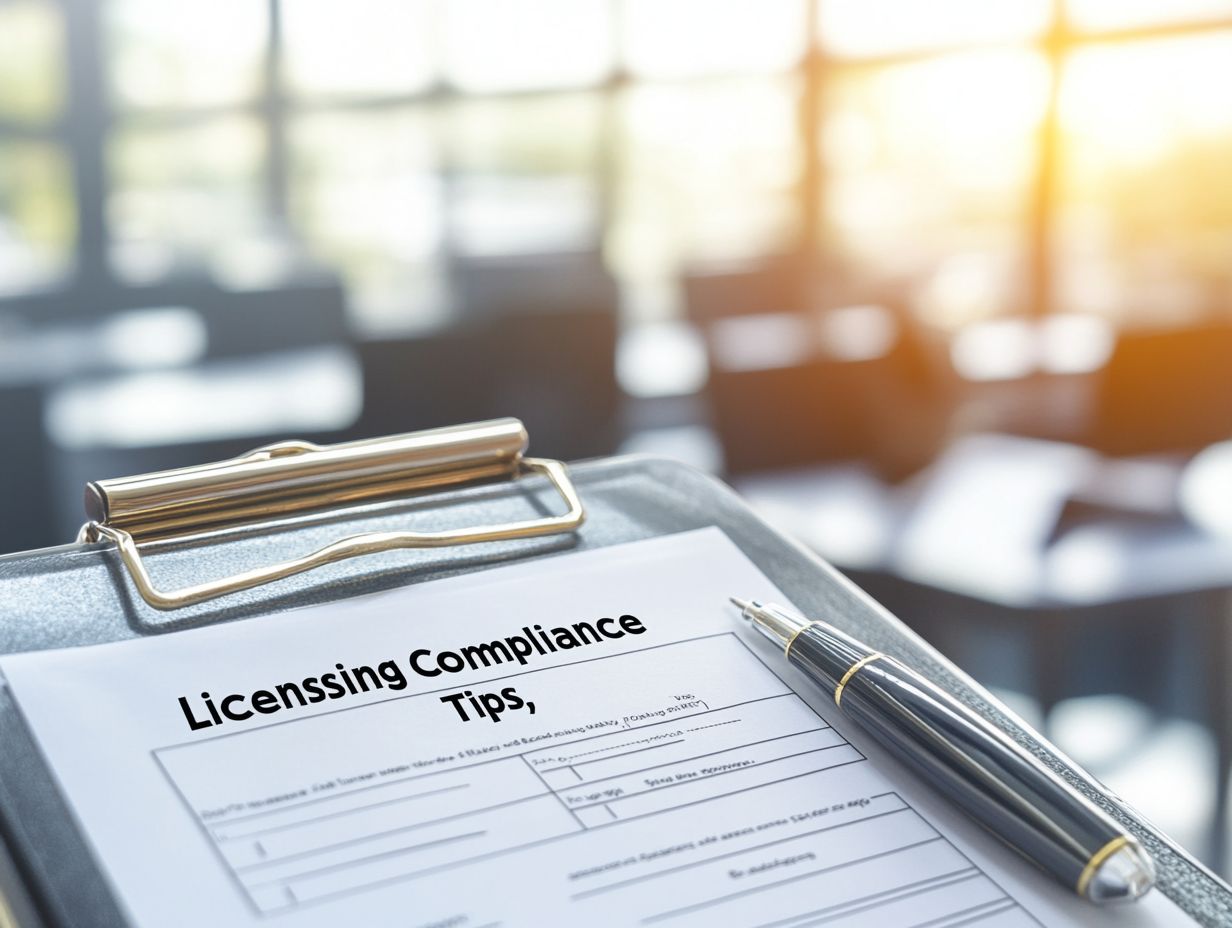
Start your compliance journey today and watch your business thrive!
What is a licensing agreement?
A licensing agreement is a legal contract. It allows one party, the licensor (the owner of an intellectual property), to let another party, the licensee (the user), use their property for a fee.
Why is compliance important for licensing agreements?
Compliance protects the rights of both parties and helps prevent legal disputes. It ensures everyone understands and follows the agreement’s terms.
What are the consequences of non-compliance with a licensing agreement?
Not following the agreement can lead to legal action or termination of the contract. This may also damage relationships and reputations.
What are the 5 essential tips for licensing agreement compliance?
Here are five key tips for staying compliant:
- Understand the terms of the agreement.
- Track your obligations and deadlines.
- Keep accurate records of usage and payments.
- Communicate regularly with the licensor.
- Consult a lawyer when necessary.
How can I ensure compliance with a licensing agreement?
To ensure compliance, thoroughly understand the agreement’s terms. Regular communication with the licensor and staying compliant with licensing agreements while maintaining accurate records are crucial.
What should I do if I discover non-compliance with a licensing agreement?
If you find non-compliance, address it immediately and notify the licensor. Additionally, consider implementing licensing agreement strategies for entrepreneurs to prevent future problems and seek legal advice if needed to resolve the issue.

